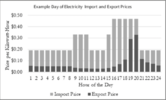bkp_duke
Well-Known Member
Didn't the government make money on the GM bailout when it sold its stake several years later? I don't have issues with a car company being publicly traded the same way I do with a public utility that operates in a market that is a natural monopoly.
It's my understanding that CPUC guarantees utilities some fixed profit (in %) for any capital they spend on projects like upgrading power lines or building new power plants (yes, PG&E is a generator as well as a grid operator). If that's true then that's absolutely nuts. It's worse than encouraging them to not be competitive, it actually gives them an incentive to be inefficient, because a fixed % of a bigger number is a larger profit.
Yes, they do guarantee a fixed % of profit. But it is worse than that. When the utilities have issues (like failed maintenance results in a major wildfire - PG&E I'm looking at you), they petition the CPUC for a rate increase, and specifically state that increase is to cover the cost of dealing with the aftermath.
The governor appoints the 5 seats on the CPUC, and guess who contributes to BOTH of the major candidates to make sure they have leverage . . . that's right, all 3 of the utilities. Millions each election cycle, and not just to the governor, but to many different candidates running for state offices that might have influence on the CPUC.
The latest NEM 3.0 is so slanted towards the utilities (it was shot down 3X before they got it passed), that I fully expect a voter referendum in 2 years. Everyone I talk to here (low socioeconomic included) is PISSED that solar costs and payback are going to skyrocket.
EDIT - no, the gov didn't make money on the bailout. GM hasn't even fully repaid the bailout money.






